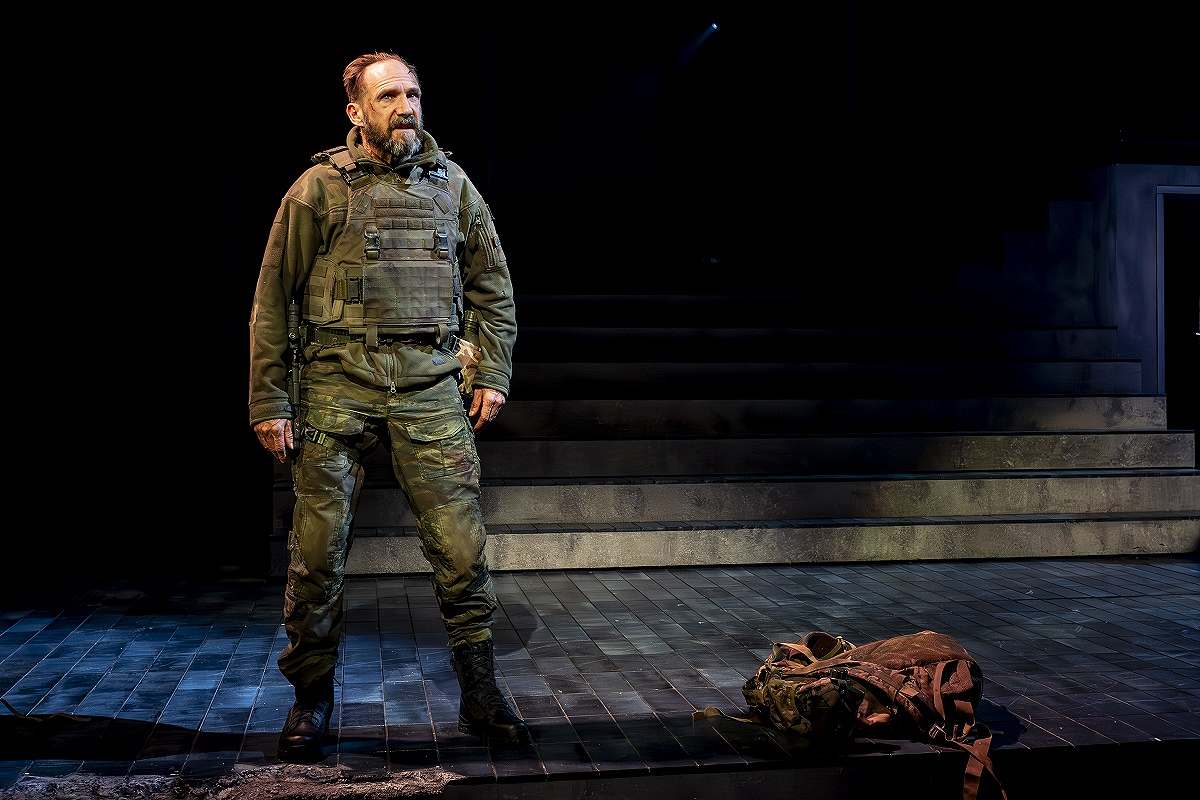
Fiennes is the titular thane in a war-torn “Macbeth.”
16:49 JST, March 29, 2024
LONDON – It was Ralph Fiennes’s mother who introduced him to his destiny. He was 8 or 9, lying atop the bunk bed he shared with his younger brother Magnus, when he asked her to tell him a story.
The tale she chose was “Hamlet.”
“She started to tell it in her own words, and I was completely hooked,” Fiennes said, recalling his childhood in a big, arty family northeast of London. “Then she said, ‘I’m going to put on the record player a great actor doing speeches from his plays.’ And it was Olivier doing ‘Hamlet’ and, on the flip side, ‘Henry V.’
“What I could hear were the cadences in Olivier’s voice,” he said. “I can still see myself on the side, following it, listening to it coming out of the speaker.”
When Shakespearean lightning strikes, having the bolts dispatched by Laurence Olivier proves everlastingly effective. For Fiennes – five decades later on the boards in a “Macbeth” coming to D.C. after a tour of three U.K. cities – is still able to savor that formative electricity.
And as Olivier once did, now Fiennes, who has played Hamlet on Broadway, Coriolanus on film and Marc Antony at London’s National Theatre, defines for audiences how Shakespeare is heard and seen.
A few months ago, Fiennes and I were sitting in his spartan dressing room in a chilly converted warehouse on the outskirts of Liverpool, the first stop in a contemporary, war-torn “Macbeth,” featuring British actress Indira Varma as Lady Macbeth and directed by Simon Godwin, artistic director of D.C.’s Shakespeare Theatre Company.
Fiennes’s appearance amounts to the starriest classical stage event in D.C. in years; it begins April 9 in the former Black Entertainment Television studios in Northeast Washington, converted into a 700-seat performance space. As in Liverpool, Edinburgh and London, Godwin wanted a “found” space for the production, which takes place in a battle-scarred landscape, strafed by Macbeth’s brutal army. Audiences walk to their seats through smoldering rubble, a visceral jolt of the toll of modern warfare.
In Godwin’s conception, the play’s famous trio of witches not only forecasts Macbeth’s fate, but also serves as commentator on the carnage. “They’re sitting on the steps, looking and saying, ‘Who’s next? Who in the audience is the next tyrant that we must guard against, or expose?’” the director said.
For star power, nothing has approached this since Helen Mirren’s Shakespeare Theatre performance in “Phèdre” in 2009. Fiennes’s casting also speaks to the rarity of a celebrated film and stage actor with an appetite to tick off a personal Shakespearean bucket list. Few stars of his caliber can boast such a rich classical résumé.
The production, making its only U.S. stop in Washington, is a coup for a city that loves its classics. The affection is underscored by the show’s brisk box office: An initial offering sold out. According to the company, another block of tickets is expected to be put on sale, but the timing is unclear because the city must still provide the needed approvals.
Fiennes greeted me warmly in Liverpool, eager to talk about the production, which originated with a reading Godwin arranged early in 2020, at the actor’s behest; the pandemic slowed the play’s trajectory. He is professorially genial in person, especially as it pertains to the work. (“That’s for you!” he declared, pointing to a space heater set up next to a cot in his spare quarters.)
His movie roles reflect a protean range, from drama (“The English Patient”) to comedy (“The Grand Budapest Hotel”) to fantasy (Voldemort in the Harry Potter series). But it is to Shakespeare that Fiennes returns again and again as a lodestar: He began his career in the mid-1980s as a servant with a few lines in an outdoor London production of “Twelfth Night.”
“My introduction to Shakespeare led me to a love of and the thrill of Shakespeare’s language,” he said. “The possibilities, on the level of its poetry, of its dramatic power, of its human richness in the psychology – that has never left me.”
And Fiennes has never really left it. Which is why, at the ripe age of 61, he has been trudging up and down this kingdom, speaking the lines of a war hero turned tyrant for audiences of school kids and pensioners and legions of Shakespeare enthusiasts. The character is sort of ageless – Denzel Washington was 65 when director Joel Coen filmed him in the role in 2020 – but Fiennes seems particularly cognizant of time’s passage. It’s he who brings up the age question.
“I have a friend who said, ‘Oh, no, you’re too old to play Macbeth,’” Fiennes recounted. “Of course, you can play it younger. But I actually think there’s a lot about ‘Macbeth’ that works if you’re a little older.” He noted that the play hints at the Macbeths having lost a child in their distant past. “There’s a great argument that they are a couple on their descending slopes,” he added. “When you get to see it as their being in the autumnal part of life, I think that it makes sense to me.”
There is nothing particularly lion-in-winterish about Fiennes. Cameras have always loved him: Remember his magnetism as the dapper cheater in “Quiz Show”? His lethal beauty in “Schindler’s List”? He yearns, though, to be acknowledged for what goes on inside his head.
“Ralph is very academic, cerebral,” said Varma, who also worked with Fiennes in Godwin’s staging of George Bernard Shaw’s “Man and Superman” in 2015 at the National Theatre.
“He’s not only played a series of these iconic parts, he’s also directed them on-screen,” Godwin said, noting that Fiennes directed himself in a bracing 2011 film version of “Coriolanus” with Gerard Butler and Vanessa Redgrave. “So I went into this very much welcoming his voice. And what’s nice about Ralph is that he’s hungry for direction, he’s hungry for feedback. But it’s feedback as a partnership, rather than hierarchical.”
Lean and fit, Fiennes embodies a rugged, no-nonsense military officer in Macbeth, who is presented with an opportunity to seize power beyond anything he could have imagined. If any psychological dimension distinguishes Godwin’s production, it’s the idea that neither Macbeth nor Lady Macbeth – who on craven impulse murder Duncan, the Scottish king – is in any way prepared for the evil they unleash.
The raw power grab that excites Lady Macbeth and incites her husband to regicide feels especially pertinent now, when the dangers of autocracy loom over political discussions. For Fiennes, though, the main attraction is to subtler aspects of the Macbeths’ personalities.
“Simon has this great thing where the cast have to write biographies of their characters,” Fiennes said of the rehearsal process. “And as it’s modern-day, I sort of said, ‘Well, he’s an intellectual army officer. He knows his philosophers. He reads his Nietzsche.’ I think there are those thinking military men who are well-read. That helped me go, ‘This is a man who can talk, who can have a moral conundrum.’”
He may play Macbeth as well-read, but Lady Macbeth’s egging him on, to kill the king, strikes Fiennes as a more primal challenge to the thane’s manhood. “I can see that if you’re deeply connected to a woman partner, who calls on you, on this, this is the final test of you as a man – this thing goes beyond your moral anxieties,” he said.
It’s great fun to listen to Fiennes wax scholarly about the character, and it helps explain why he is devoting the better part of a year to a “Macbeth” that plays to mere hundreds in barracks-like spaces. “I didn’t want to go into the West End, because it feels like a well-worn path,” he said. (The London run was staged in a warehouse outside the city’s center.) “I love being in a company – the thing of being in a group. I miss it when I do films. I miss that sense of community that you get in a stage production.”
When Fiennes talks about favorite experiences, that notion of communal endeavor inevitably crops up. “One of the happiest productions I was in,” he said, “I played a small part in a production of ‘King John,’” at Stratford-upon-Avon, the Royal Shakespeare Company’s home. “Deborah Warner directed, and I played the Dauphin, which is a small part, fun part, but small.”
After the tour ends in May, Fiennes starts filming “The Choral,” written by Alan Bennett, directed by Nicholas Hytner and co-starring theater veterans Jim Broadbent and Simon Russell Beale. In the meantime, digging deep into a meaty stage role – wrestling in plain sight night after night with text, relationships, motivation – holds infinite pleasure. I saw this “Macbeth” a second time after it had moved to London, and the bond forged by Fiennes and Varma felt more symbiotic, their tragedy more emphatically a result of a mutually assured destruction.
It’s in the nature of a protracted run that a work of timeless drama will continue to evolve, an outcome that is central to Fiennes’s satisfaction.
“Have you got what you need?” the actor asked me as we parted. What seemed more to the point was that in active dialogue with the dramatist who first inspired him, Fiennes certainly has what he needs.
"News Services" POPULAR ARTICLE
-

American Playwright Jeremy O. Harris Arrested in Japan on Alleged Drug Smuggling
-

Japan’s Nikkei Stock Average as JGB Yields, Yen Rise on Rate-Hike Bets
-

Japan’s Nikkei Stock Average Licks Wounds after Selloff Sparked by BOJ Hike Bets (UPDATE 1)
-

Japan’s Nikkei Stock Average Buoyed by Stable Yen; SoftBank’s Slide Caps Gains (UPDATE 1)
-

Japanese Bond Yields Zoom, Stocks Slide as Rate Hike Looms
JN ACCESS RANKING
-

Tokyo Economic Security Forum to Hold Inaugural Meeting Amid Tense Global Environment
-

Keidanren Chairman Yoshinobu Tsutsui Visits Kashiwazaki-Kariwa Nuclear Power Plant; Inspects New Emergency Safety System
-

Imports of Rare Earths from China Facing Delays, May Be Caused by Deterioration of Japan-China Relations
-

University of Tokyo Professor Discusses Japanese Economic Security in Interview Ahead of Forum
-

Japan Pulls out of Vietnam Nuclear Project, Complicating Hanoi’s Power Plans

























